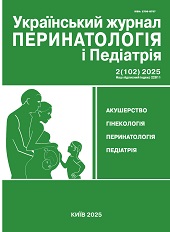Prognostic value of elevated SLPI levels for early detection of sepsis in children with community-acquired pneumonia
DOI:
https://doi.org/10.15574/PP.2025.2(102).4753Keywords:
community-acquired pneumonia, sepsis, children, Phoenix Sepsis Score, secretory leukocyte protease inhibitor (SLPI), prognostic markersAbstract
Sepsis is one of the most serious complications of community-acquired pneumonia in school-aged children, requiring early diagnosis and risk stratification. Although the Phoenix Sepsis Score has been introduced to assess organ dysfunction, its sensitivity during the first hours of hospitalization remains limited. Evaluating the serum level of secretory leukocyte protease inhibitor (SLPI) as an additional sepsis biomarker may enhance early identification of severe infection.
Аim - to determine the prognostic significance of serum SLPI levels for the early detection of sepsis in children with community-acquired pneumonia.
Materials and methods. A total of 135 children aged 5–18 years with bacterial community-acquired pneumonia were examined. Sepsis was assessed using the Phoenix Score (≥2 points indicating sepsis). SLPI levels were measured by ELISA and stratified by quartiles. Statistical analysis included the χ² test, logistic regression, and ROC analysis (AUC, ΔAUC), with adjustment for age, sex, and disease severity.
Results. Sepsis was identified in one-third of patients within the first 24 hours of hospitalization. In the fourth SLPI quartile, the proportion of sepsis reached 50%, compared to only 20.6% in the first quartile. Elevated SLPI levels were associated with increased sepsis risk. Adding SLPI to the baseline model of routine inflammatory markers increased the AUC from 0.65 to 0.69, and sensitivity from 21% to 67%. In the final model, only elevated SLPI and D-dimer levels remained independent prognostic markers.
Conclusions. Elevated SLPI levels in children with community-acquired pneumonia represent an independent risk marker for sepsis and enhance the predictive accuracy of screening models. SLPI determination should be considered for inclusion in standard laboratory monitoring during the first day of hospitalization.
This study was conducted in accordance with the principles of the Declaration of Helsinki. The study protocol was approved by the Local Ethics Committee of the institution. Informed consent was obtained from all patients (parents or legal guardians).
The authors declare no conflict of interest.
References
Hadzhieva-Hristova A, Krumova D, Stoeva T, Georgieva R, Iotova V. (2025). Assessment of Phoenix Sepsis Score, pSOFA, PELOD-2, and PRISM III in Pediatric Intensive Care. Children (Basel, Switzerland). 12(3): 262. https://doi.org/10.3390/children12030262; PMid:40150545 PMCid:PMC11941747
Koliou MG, Aristidou A, Mazeri S, Nikolopoulos G, Argyrou M, Haralambous C et al. (2025). Incidence and severity of community acquired pneumonias in children before and after the COVID-19 pandemic. Journal of public health (Oxford, England). 47(1): 9-14. https://doi.org/10.1093/pubmed/fdae292; PMid:39580230 PMCid:PMC11879108
Lange A, Cajander S, Magnuson A, Sundén-Cullberg J, Strålin K, Hultgren O. (2019). Plasma concentrations of secretory leukocyte protease inhibitor (SLPI) differ depending on etiology and severity in community-onset bloodstream infection. European journal of clinical microbiology & infectious diseases : official publication of the European Society of Clinical Microbiology. 38(8): 1425-1434. https://doi.org/10.1007/s10096-019-03567-2; PMid:31089838 PMCid:PMC6647850
Massaud-Ribeiro L, Silami PHNC, Lima-Setta F, Prata-Barbosa A. (2022). Pediatric Sepsis Research: Where Are We and Where Are We Going? Frontiers in pediatrics. 10: 829119. https://doi.org/10.3389/fped.2022.829119; PMid:35223703 PMCid:PMC8873512
Ministry of Health of Ukraine, State Enterprise "State Expert Center of the Ministry of Health of Ukraine", Association of Pediatricians of Ukraine. (2022). Pneumonia in children: An evidence-based clinical guideline. URL: https://www.dec.gov.ua/mtd/pozalikarnyani-pnevmoniyi-u-ditej/.
Mongkolpathumrat P, Pikwong F, Phutiyothin C, Srisopar O, Chouyratchakarn W, Unnajak S et al. (2024). The secretory leukocyte protease inhibitor (SLPI) in pathophysiology of non-communicable diseases: Evidence from experimental studies to clinical applications. Heliyon. 10(2): e24550. https://doi.org/10.1016/j.heliyon.2024.e24550; PMid:38312697 PMCid:PMC10835312
Schlapbach LJ, Watson RS, Sorce LR, Argent AC, Menon K, Hall MW et al. (2024). International Consensus Criteria for Pediatric Sepsis and Septic Shock. JAMA. 331(8): 665-674. https://doi.org/10.1001/jama.2024.0179; PMid:38245889 PMCid:PMC10900966
Downloads
Published
Issue
Section
License
Copyright (c) 2025 Ukrainian Journal of Perinatology and Pediatrics

This work is licensed under a Creative Commons Attribution-NonCommercial 4.0 International License.
The policy of the Journal “Ukrainian Journal of Perinatology and Pediatrics” is compatible with the vast majority of funders' of open access and self-archiving policies. The journal provides immediate open access route being convinced that everyone – not only scientists - can benefit from research results, and publishes articles exclusively under open access distribution, with a Creative Commons Attribution-Noncommercial 4.0 international license(СС BY-NC).
Authors transfer the copyright to the Journal “MODERN PEDIATRICS. UKRAINE” when the manuscript is accepted for publication. Authors declare that this manuscript has not been published nor is under simultaneous consideration for publication elsewhere. After publication, the articles become freely available on-line to the public.
Readers have the right to use, distribute, and reproduce articles in any medium, provided the articles and the journal are properly cited.
The use of published materials for commercial purposes is strongly prohibited.

